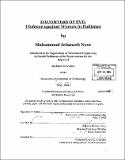Daughters of Eve : violence against women in Pakistan
Author(s)
Noor, Muhammad Jehanzeb, 1982-
DownloadFull printable version (6.240Mb)
Other Contributors
Massachusetts Institute of Technology. Dept. of Mechanical Engineering.
Advisor
Rebecca Blevins Faery.
Terms of use
Metadata
Show full item recordAbstract
The purpose of this study was to conduct extensive research on domestic violence against women in Pakistan and to present the results in a comprehensive document. Some of the issues investigated through fieldwork and covered here include the social and cultural reasons for violence against women, the ways in which the women are victimised, the extent of this violence and its implications for the victims and society at large. Emphasis was placed on the review of shortcoming of laws for protection of women. At the end, detailed recommendations were made for practical steps in which women can be given more legal protection, and society can be sensitised to the rights of women. It was found that some of the major reasons for violence against women include treatment of women as objects and property, legitimisation of cruel practices through tradition and misinterpretation of religion, and patriarchal nature of society that enables men to reinforce their social power through subjugation of women. While around 80% of Pakistani women are reported to face some form of domestic violence every year, horrific crimes such as honour killings, acid burnings and marital rape are also quite common. There are several absurd practices such as exchanging of women to settle tribal disputes and selling them to payoff debt, which depict the treatment of women as commodities. The violence against women goes unchecked because of an unjust legal system that leads to unfair settlements and custodial violence against women. The brutalisation and torture of women has several negative impacts that start with the continuous fear and feelings of worthlessness among the victims. Large-scale mistreatment of women forces economic backwardness on them and creates widespread gender-disparity (cont.) in the country. There are several possible measures that should be taken to stop the self-perpetuating and vicious cycle of violence against women. These include gender-training programs for law-enforcement and judicial personnel, the addition of materials that teach the importance of equal rights of women in school and college curricula, and a large-scale collaboration between the government and the private sector to create support and shelter facilities for women in distress. Other steps such as constitutional amendments to abolish biased laws and to incorporate gender-neutrality in civil jurisdiction are very important as well. Though the overall picture is quite bleak for women in Pakistan, there are some rays of hope through isolated cases in which society has supported victimised women and the legal system has dispensed justice. Overall, this report is a manifesto for improving the plight of millions of battered women in Pakistan who deserve social justice.
Description
Thesis (S.B.)--Massachusetts Institute of Technology, Dept. of Mechanical Engineering, 2004. Includes bibliographical references (p. 120-121).
Date issued
2004Department
Massachusetts Institute of Technology. Department of Mechanical EngineeringPublisher
Massachusetts Institute of Technology
Keywords
Mechanical Engineering.